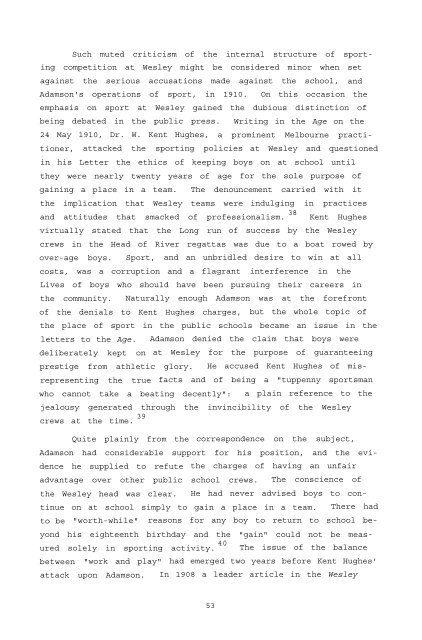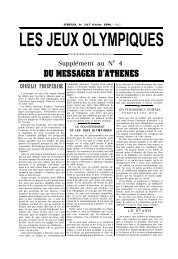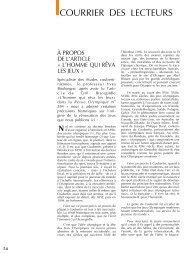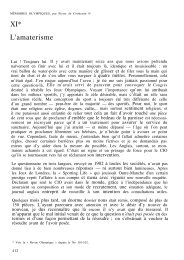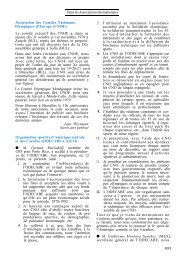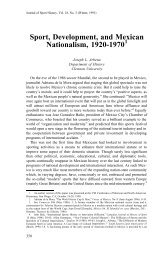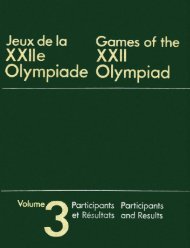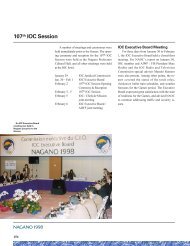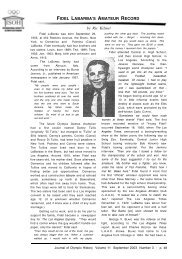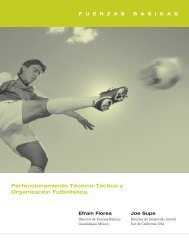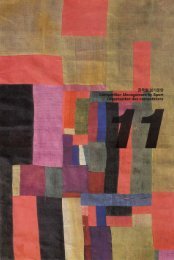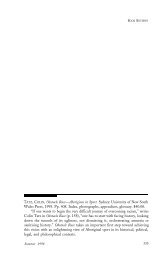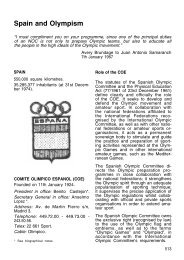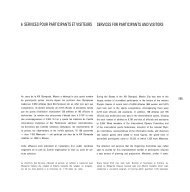Sport and Colonialism in 19th Century Australasia - LA84 Foundation
Sport and Colonialism in 19th Century Australasia - LA84 Foundation
Sport and Colonialism in 19th Century Australasia - LA84 Foundation
You also want an ePaper? Increase the reach of your titles
YUMPU automatically turns print PDFs into web optimized ePapers that Google loves.
Such muted criticism of the <strong>in</strong>ternal structure of sport<strong>in</strong>g<br />
competition at Wesley might be considered m<strong>in</strong>or when set<br />
aga<strong>in</strong>st the serious accusations made aga<strong>in</strong>st the school, <strong>and</strong><br />
Adamson's operations of sport, <strong>in</strong> 1910. On this occasion the<br />
emphasis on sport at Wesley ga<strong>in</strong>ed the dubious dist<strong>in</strong>ction of<br />
be<strong>in</strong>g debated <strong>in</strong> the public press. Writ<strong>in</strong>g <strong>in</strong> the Age on the<br />
24 May 1910, Dr. W. Kent Hughes, a prom<strong>in</strong>ent Melbourne practitioner,<br />
attacked the sport<strong>in</strong>g policies at Wesley <strong>and</strong> questioned<br />
<strong>in</strong> his Letter the ethics of keep<strong>in</strong>g boys on at school until<br />
they were nearly twenty years of age for the sole purpose of<br />
ga<strong>in</strong><strong>in</strong>g a place <strong>in</strong> a team. The denouncement carried with it<br />
the implication that Wesley teams were <strong>in</strong>dulg<strong>in</strong>g <strong>in</strong> practices<br />
<strong>and</strong> attitudes that smacked of professionalism. 38<br />
Kent Hughes<br />
virtually stated that the Long run of success by the Wesley<br />
crews <strong>in</strong> the Head of River regattas was due to a boat rowed by<br />
over-age boys. <strong>Sport</strong>, <strong>and</strong> an unbridled desire to w<strong>in</strong> at all<br />
costs, was a corruption <strong>and</strong> a flagrant <strong>in</strong>terference <strong>in</strong> the<br />
Lives of boys who should have been pursu<strong>in</strong>g their careers <strong>in</strong><br />
the community. Naturally enough Adamson was at the forefront<br />
of the denials to Kent Hughes charges, but the whole topic of<br />
the place of sport <strong>in</strong> the public schools became an issue <strong>in</strong> the<br />
letters to the Age. Adamson denied the claim that boys were<br />
deliberately kept on at Wesley for the purpose of guarantee<strong>in</strong>g<br />
prestige from athletic glory. He accused Kent Hughes of misrepresent<strong>in</strong>g<br />
the true facts <strong>and</strong> of be<strong>in</strong>g a "tuppenny sportsman<br />
who cannot take a beat<strong>in</strong>g decently": a pla<strong>in</strong> reference to the<br />
jealousy generated through the <strong>in</strong>v<strong>in</strong>cibility of the Wesley<br />
crews at the time. 39<br />
Quite pla<strong>in</strong>ly from the correspondence on the subject,<br />
Adamson had considerable support for his position, <strong>and</strong> the evidence<br />
he supplied to refute the charges of hav<strong>in</strong>g an unfair<br />
advantage over other public school crews. The conscience of<br />
the Wesley head was clear. He had never advised boys to cont<strong>in</strong>ue<br />
on at school simply to ga<strong>in</strong> a place <strong>in</strong> a team. There had<br />
to be "worth-while" reasons for any boy to return to school beyond<br />
his eighteenth birthday <strong>and</strong> the "ga<strong>in</strong>" could not be measured<br />
solely <strong>in</strong> sport<strong>in</strong>g activity. 40<br />
The issue of the balance<br />
between "work <strong>and</strong> play" had emerged two years before Kent Hughes'<br />
attack upon Adamson. In 1908 a leader article <strong>in</strong> the Wesley<br />
53


